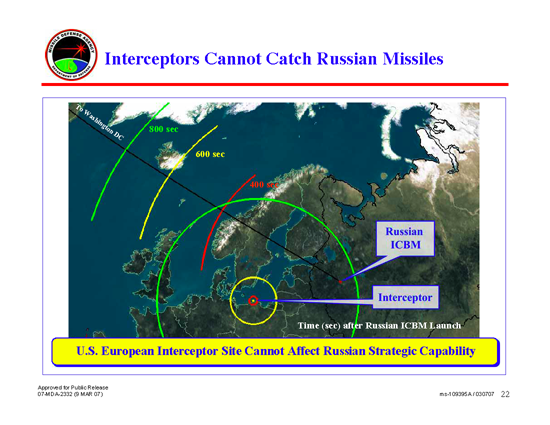In February 2007, Gazeta Wyborcza reported that four sites were under consideration for the US interceptor site in Poland: Zegrze Pomorskie, Debrzno, and Slupsk-Redzikowo.
Since then, Redzikowo — a now defunct Polish airbase — has been looking like the place. At least that is what the Polish press claims. Oh, and MDA released this slide, which puts a notional interceptor site, oh, right about where Redzikowo is located. Click on the image for a GoogleEarth (.kmz) file, though there isn’t much to see.
Now, Allen Thomson sends along a note pointing to this article about Polish Defense Minister Aleksander Szczyglo meeting Slupsk governor Slawomir Ziemianowicz on Thursday to discuss the possibility of his region hosting a U.S. missile defense site.
So, we’ve got our candidate. Now, how do the locals feel about it?
The press coverage of local reaction to the missile shield is spectacular. The US press goes with a simplistic “The Czechs don’t want missile defense, but the Poles do …” Judy Dempsey in the International Herald Tribune reports that “public opinion, at least in the areas considered as possible sites for the 10 interceptors, is strongly behind the United States. For the locals, it is about jobs, not the environment.”
Reuters’ Barbara Sladkowska does better, but the prize goes to PAP, the Polish news agency.
PAP has a balanced story about local reaction (full text in the comments) with some, uh, local color:
Redzikowo (Pomorskie), lying only four kilometres from the centre of Slupsk, was brought into the centre of attention by Zycie Warszawy, which reported just before US Assistant Secretary of State John Rood’s visit to Poland that the Americans want to build their anti-missile installations precisely here. That report was repeated by other media sources, and journalists began to arrive in Redzikowo. Some residents are already fed up. Beer-sipping youths curtly told one television crew to “get the f… out of our neighbourhood.”
Oi.


Comments